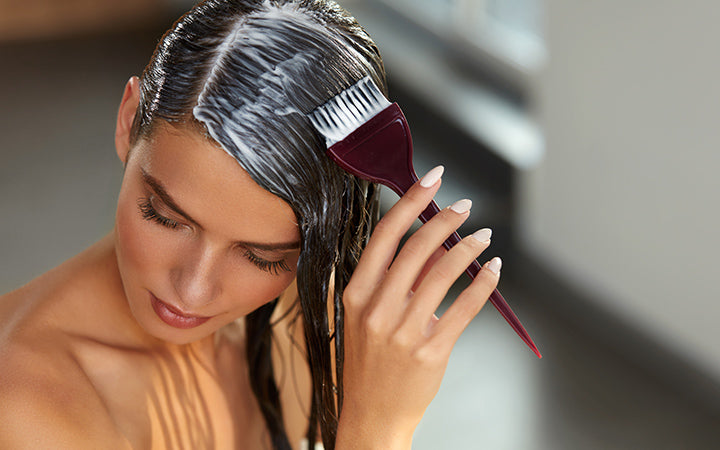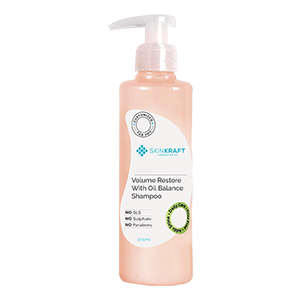As much as you love the monsoons, it is hard to ignore the havoc it can wreak on your beloved tresses. The rainy season can also bring with it a plethora of hair and scalp issues. So how do you manage them?
In this article, we bring to you the ultimate hair care guide for the monsoon to keep your precious locks glowing and healthy!
Highlights:
Why Does Hair Fall Occur In Monsoon?
The air is laden with high amounts of moisture during the rainy season. This excessive moisture traps the dirt and grime on your scalp as well as on the hair shafts. This makes the hair follicles weak and the hair strands coated. This is the primary reason for hair fall during the monsoons.
Additionally, this weather condition not only makes it difficult for the hair to dry but also makes it dull and frizzy. Also, the depositions near the hair roots become the breeding ground of bacteria and fungi which can aggravate your dandruff troubles. The acidity in rainwater can also be responsible for the excess hair loss.
How To Take Care Of Hair In Monsoon?
1. Protect Your Hair From Rainwater
The rainwater is often acidic or dirty which can harm your hair. Wear a waterproof hoodie or scarf to protect your hair from the adverse effects of the rain. If you cannot avoid contact of your hair with rainwater, wash your hair immediately after reaching home.
2. Establish A Proper Hair Wash Routine
Wash your hair at least twice or thrice a week to remove the depositions from your hair and scalp. Use an antibacterial or antifungal shampoo to prevent buildup of germs at the roots of your hair.
It is best to use a leave-in conditioner to protect your hair as well as to prevent the frizz and dullness. You can also do a hot oil massage prior to washing your head. This will help increase the blood circulation in your scalp making your hair stronger.
3. Keep Your Hair Dry
As the percentage of humidity is already high in the rainy season, you should take extra care to keep your hair dry during this time.. Excess moisture can make your hair heavy and limp. Use a clean, soft towel to dry your hair after a wash. Do not tie your hair while it is wet as this will damage the roots of your hair.
4. Use The Right Comb
It is better to use a wide toothed comb for your hair, especially when it is wet.
The hair is weak at the roots and prone to breakage when it is wet. Combing gently with a wide tooth comb will help detangle your hair easily, thus reducing hair fall.
5. Keep Your Hair Short
It is best to maintain a short hair style if you are facing a lot of hair fall during monsoon. Long hair gets pulled and is likely to fall out more. Trimming the ends of your hair will also remove the damaged or split ends, thus making your hair grow better.
6. Adopt A Hassle-free Hairstyle
It is best to go for a minimum styling hairdo during the rainy season. Use of heat and styling products can make your hair weaker and prone to breakage. You can opt for a tight bun, high ponytail or short braid according to the length of your hair.
7. Follow A Proper Diet
Your diet has an important role to play in maintaining the health of your hair. Make sure to eat a proper diet that includes green vegetables, dairy products, eggs, walnuts, nuts, etc. to add shine and luster to your hair and promote its growth. Drink adequate water too to keep your body hydrated.
8. Show Some Extra Love To Your Hair
Use a hair care active such as a hair serum suitable for your hair type. This will nourish your hair and prevent frizziness, hair breakage, etc. To understand your hair better take SkinKraft’s KnowYourHair quiz and receive products customised for your hair’s specific needs.
Monsoon Hair Care Tips For Different Hair Issues
|
Hair Issue |
Hair care tips |
|
Oily Hair |
Wash your hair regularly with a light, gel-based shampoo to get rid of excess oil and dirt. Use a light conditioner or serum so that your hair does not become too oily or sticky. |
|
Itchy Scalp |
Deposition of oil, dirt and dead cells makes your scalp itchy during the monsoons. Wash your hair regularly with an antibacterial or antifungal shampoo to keep your scalp and hair clean. Use a hair mask that suits your hair type. |
|
Dandruff |
Warm an organic hair oil and massage onto your scalp. This will remove the depositions from the hair roots. Use an anti-dandruff shampoo to wash it off. |
|
Frizzy Hair |
Avoid getting soaked in the rain. Also avoid harsh chemical treatments during the monsoons. Use a nourishing hair mask, herbal shampoo and leave in conditioner to control frizz and damage during the rainy season. |

What Should You Apply On Your Hair During Monsoon?
Here are three simple DIY hair masks to keep your locks healthy and beautiful during the rainy season.
1. Fenugreek And Lemon
Fenugreek has anti-dandruff and anti-inflammatory properties while lemon is rich in vitamin C and limonoids that help fight germs. Mix the juice of a freshly squeezed lemon with powdered fenugreek seeds. Apply this mask for 30 minutes. Finally rinse off with a mild herbal shampoo.
2. Neem And Turmeric Paste
This mask is rich in antioxidants as well as antimicrobial compounds. It will help fight germs, prevent dandruff, itchiness or inflammation of the scalp. Crush fresh neem leaves and root of turmeric and blend them to form a smooth paste. Gently massage this mix on your scalp and leave for 20 to 30 minutes. Wash off with a gentle shampoo and apply a conditioner.
3. Aloe Vera And Yoghurt
Aloe vera gel soothes itchy, inflamed scalp while the lactic acid present in yoghurt gently exfoliates your scalp.This mask will help remove the depositions of cell debris, dirt, etc. from the hair roots and add shine to your locks. Mix a tablespoon of freshly extracted aloe gel with the required amount of yoghurt for best results. Apply this mask on your scalp and hair, and let it dry. Wash it off with a gentle, fragrance free shampoo.
How Much Hair Fall Is Normal In The Rainy Season?
According to most experts there may be a 30% increase in hair fall during the rainy season. Your hair undergoes a cycle comprising of growth, resting and shedding phases. Under normal conditions you may lose 50 to 100 strands of hair everyday which gets eventually replaced if you have a normal hair cycle.
Due to the weather conditions during monsoons you may face upto 150 hair strands a day. But taking good care of your hair and addressing the related issues will help reduce your hair fall problems and stimulate new hair growth.
Wrapping Up
The monsoon brings with it excess moisture which can adversely affect your hair. You need to take extra care of your hair to prevent its damage. Hair concerns like dandruff, frizziness, excessive oiliness, etc. need to be addressed appropriately, so that the weather does not make the situation worse. In general, eating a healthy diet, keeping your hair clean and dry, using a hair active and hair mask will keep your hair happy during this rainy season.
Recommended Products
Was this Article helpful?
- Least helpful
- Most helpful











